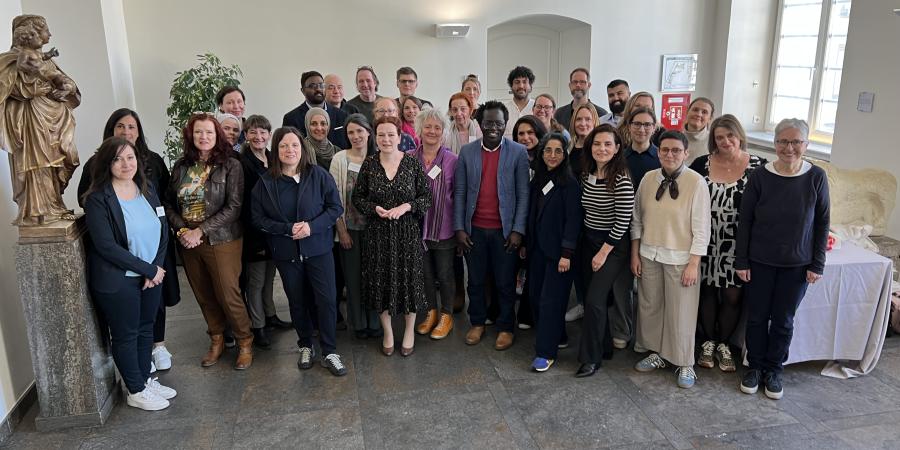
On Monday, April 7, 2025, the German-speaking ECCAR city meeting took place. Representatives from over 20 cities and municipalities gathered to exchange recent developments in local work against racism.
Official opening and thematic presentations
Katja Dörner, Lord Mayor of the City of Bonn, officially opened the event, and Reem Alabali-Radovan, Federal Government Commissioner for Anti-Racism, Minister of State to the Federal Chancellor, and Federal Government Commissioner for Migration, Refugees, and Integration, delivered her digital welcome address.
Coletta Manemann, Head of the Office for Integration and Diversity of the City of Bonn, gave an insight into her office’s work. Her colleague, Zeynep Pirayesh, Deputy Head of the Office for Integration and Diversity, presented an innovative example, highlighting how the city administration has raised awareness of racism through explanatory videos on the municipal intranet. These videos featured employees sharing their personal experiences of discrimination to promote awareness of diversity.
Dr Cihan Sinanoğlu, Head of the National Monitoring of Discrimination and Racism (NaDiRa) project, presented key findings from current research and their relevance for municipal work, leading to a lively discussion on methodological challenges, political implications, and the significant drop in public trust in institutions. He also introduced the new "Working Definition of Racism," published on 11 March 2025 by the German Federal Commissioner for Anti-Racism, Reem Alabali-Radovan. The definition was developed in collaboration with the Anti-Racism Expert Council, in which Dr Sinanoğlu was a member. The discussion with the participants centred on implementing the definition at the municipal level, despite political resistance and the economic implications of racism. Emphasis was also placed on the need for a long-term shift from integration to anti-racism as a strategic focus. Finally, Dr Isabella Meier, Senior Social Scientist at the European Training and Research Centre for Human Rights and Democracy, gave a presentation on advisory services for implementing the ECCAR 10-point action plan.
Current developments in cities: an overview of measures against racism and discrimination
Numerous measures to combat racism and discrimination are currently being implemented in German ECCAR member cities and municipalities. Common approaches include the revision and implementation of local action plans, targeted training for administrative staff and managers and the development of action plans to combat anti-Semitism, right-wing extremism and other forms of discrimination. Additionally, regular dialogue events and panel discussions are held to raise awareness among the population and foster exchange between diverse social groups. Another key element is the establishment of anti-discrimination offices and the promotion of projects that raise awareness among children and young people. Despite this progress, challenges remain, including financial constraints and structural barriers, which hinder the full implementation of these measures.
Presentation of the "Municipalities for All" project focusing on institutional racism at the municipal level
ECCAR Director Evein Obulor presented the new project launched in 2025 and funded by the German Federal programme “Demokratie Leben”. The participants provided feedback on the current state of the art regarding tackling structural racism, empowering staff with experiences of racism, measures for intercultural openness, and the resistance they have experienced in addressing racism and being critical of their structures within city administrations.
Many German cities are implementing various measures to address institutional racism within their administrations, including workshops, training on intercultural issues, diversity days, and anonymous application processes. However, there are significant challenges, such as resistance from management, a lack of self-reflection, and inadequate resources, which hinder effective implementation. Although initial efforts have been made, a more comprehensive approach and mandatory training for management are needed to ensure sustainable progress. The participants concluded that robust internal structures and clear support from top leadership are essential for effectively recognising and dismantling institutional racism. ECCAR will continue the exchange on the project’s progress with the German member cities. They will have the opportunity to apply to become part of the project and test the foreseen training modules during the next project years.
